Posted on: December 12, 2024, 07:22h.
Last updated on: December 12, 2024, 07:22h.
A multiple sclerosis (M.S.) sufferer in the UK has received a £70,000 (US$89,000) settlement from the country’s National Health Service (NHS) after a drug prescribed by his doctor caused him to develop an “uncontrollable” gambling habit, The Independent reports.

Philip Stevens, from Hampshire, England, blew thousands of pounds on gambling websites after being prescribed Ropinirole, a common Parkinson’s drug that is also used to treat restless legs syndrome, a potential symptom of MS.
The 66-year-old claimed in a lawsuit that he developed an impulse control disorder (ICD) after he began taking the drug in 2017. This also caused Stevens to shop compulsively, splurging thousands on expensive clothes, according to the lawsuit.
All-Consuming Obsessions
ICD is listed as a possible side effect of taking Ropinirole, which is also commonly prescribed in the U.S.
In Britain, the NHS advises that patients contact a specialist nurse if they start “binge eating, gambling or shopping uncontrollably or have an unusually high sex drive” after taking the drug. However, Stevens claims he was not warned about potential side effects.
Stevens says Ropinirole transformed harmless interests into all-consuming obsessions. He had previously enjoyed horse racing and gambled moderately. He placed the occasional bet on horses where he believed he had a chance of winning. But after taking Ropinirole, his gambling quickly spiraled out of control.
Stevens would wake up in the middle of the night to place bets on anything he could and eventually stopped caring about winning anything at all.
Similarly, while he had previously enjoyed the occasional fishing trip, he suddenly felt compelled to go on three-day-long fishing trips every week.
“The things that I once enjoyed that became obsessions, such as fishing and horse racing, are now joyless because, with each one, a sense of guilt overcomes me. I am not the same person as I was, pre-Ropinirole,” he told The Independent.
Withdrawal Effects
In October 2021, Stevens was asked by a neurologist if he experienced any side effects such as compulsive behavior and he mentioned his gambling. He was advised to immediately cease taking the drug.
However, he received no advice about withdrawal symptoms, which included severe exhaustion, paranoia, and hallucinations so severe he could not recognize his wife or children, according to court filings.
There has for some time been concern about how some drugs can affect impulse control in patients. The law firm representing Stevens secured a similar settlement from the NHS in 2013 over a patient developing compulsive gambling and shopping after taking Ropinirole.
In 2018, Casino.org reported that more than 635 gambling-related lawsuits had been filed in the U.S. on behalf of plaintiffs who developed various impulsive disorders while using the antidepressant aripiprazole, commonly known by the brand name Abilify.
